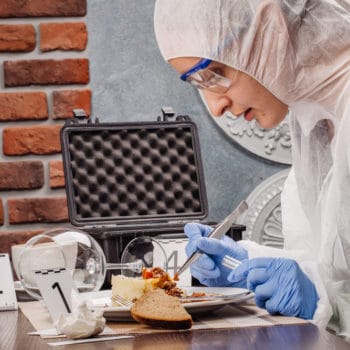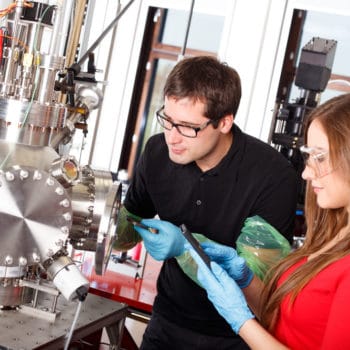Why We Love It
-
$45,230Potential Avg. Salary
-
5.3%Job Growth Rate
-
Growing DemandJob Outlook
-
Dependable Daily WorkloadCareer Attribute
A biological laboratory technician works with biologists, medical professionals or criminal justice personnel to assist with their research, i.e. from collecting samples, running various experiments to lab tests.
Recommended Schools
What is a Biological Laboratory Technician?
Duties
As a Biological Laboratory Technician, one has to undertake several important functions including the following:
- Supervise, coordinate, manage and carry out independent laboratory experiments to contribute to research projects.
- Be responsible for overseeing students or junior researchers working in the laboratory on a daily basis, including general maintenance tasks like ordering or purchasing supplies and keeping records.
- Maintain an organized notebook for tracking experimental protocols and data, with close supervision and guidance from the principal investigator (PI).
- Provide basic trainings to other staff members and students through frequent communication to ensure that safety regulations are followed.
- Make solutions and reagents, properly dispose of biohazardous waste or chemicals as requested by the PI.
Day In The Life
Based on where you work, the private industry or a government research facility, you will be supporting researchers with scientific tests, analyses and experiments. The studies you are involved in can have wide-ranging impact such as monitoring production processes to protect against contamination, growing cultures in petri dishes to aid microbiological experiments, developing medical treatments to tackle diseases, etc. You will meet and work closely with scientists, faculty members, students and others depending on the assignment.
Day-to-day operations include utilizing traditional laboratory instruments, advanced computer software and robotics technology to carry out specialised experiments, analyse biological samples and model the data collected. Sometimes, your position will need you to assist with scientific procedures involving animals as directed. If your role involves field work, much of the day will be spent outside hiking long distances to reach specific sites for water or debris samples.
Work Schedule And Typical Hours
In this role, you can expect to keep regular hours – around 40 hours per week and work full-time. Working during holidays or over the weekend is rare and might occur to keep to agreed deadlines for projects.
The work environment can range from a fully equipped laboratory to a functional office space, where you will undertake studies and experiments under the guidance of biological and medical scientists. When doing fieldwork for live samples, you may be working outdoors in rough terrain, exposed to various weather and the occasional wildlife.
Growth Of The Job
Jobs in this industry are projected to grow at the rate of 5% between 2014-2024, above the national average. With rising demand for biotechnology research, there will be better employment opportunities available for workers in this field.
There will be new and innovative research towards building resistance against diseases like cancer, AIDS and Alzheimer’s disease. Genetic engineering for plants and crops is developing rapidly to provide higher yields and require less treatment, requiring more lab technicians who can conduct scientific research to carry out tests for viable solutions in this regard.
Biological laboratory technicians are also essential for the successful operations of privately owned pharmaceutical firms and government agencies,.You have greater chances of progressing faster as a biological laboratory technician if you have extensive experience in research settings and an advanced education. Most technicians move on to positions such as national sciences managers or scientists.
Typical Employers
You can find work in a wide range of research-intensive industries like medical research, biological sciences, molecular biology, environmental toxicology, pharmaceuticals, resource management, agricultural sciences, criminal justice, etc.
Some employers that are hiring biological laboratory technicians include: Medical Diagnostic Laboratories LLC, The Henry M. Jackson Foundation, Clinical Research Management, Bio-Reference Laboratories, Inc., Piney Technical Services, Montrose Environmental Group, Inc., Charles River Laboratories and Moses Lake Industries.
Recommended Schools
How To Become a Biological Laboratory Technician
To become a biological laboratory technician, you must possess a two-year degree or technical certificate. If your certificate program is accredited by the National Accrediting Agency for Clinical Laboratory Sciences, you can transfer those credits towards an undergraduate qualification. According to the US Bureau of Labour Statistics, most in the profession obtain a certificate in clinical lab technology during their time in the Armed Forces, while others receive training with a hospital or vocational school.
In order to succeed on this career path, you must have superior organizational and communication skills to maintain an efficient work schedule. Much of the work requires developing effective working relationships and completing requests from often multiple managers and supervisors. You will also handle sensitive materials and information, which requires full confidentiality.
Biological Laboratory Technician Salary Data
We’ve provided you the following to learn more about this career. The salary and growth data on this page comes from recently published Bureau of Labor Statistics data while the recommendations and editorial content are based on our research.
National Anual Salary
Low Range
$32,990Average
$45,230High Range
$69,180National Hourly Wage
Low Range
$16/hrAverage
$22/hrHigh Range
$33/hrHow do Biological Laboratory Technician salaries stack up to other jobs across the country? Based on the latest jobs data nationwide, Biological Laboratory Technician's can make an average annual salary of $45,230, or $22 per hour. This makes it an Above Average Salary. On the lower end, they can make $32,990 or $16 per hour, perhaps when just starting out or based on the state you live in.
Salary Rankings And Facts
#447 Nationally for All Careers
Programs and Degrees
Here are the most common degrees for becoming a Biological Laboratory Technician. a is usually recommended and specifically a degree or coursework that prepares you for the particular field, see below.
Highest Education Among Biological Laboratory Technicians
- 7.4% Doctorate
- 7.4% Masters
- 36.3% Bachelors
- 9.4% Associates
- 21% College
- 17.1% High School
- 1.4% Less than High School
Job Growth Projections and Forecast
2014 Total Jobs
79,3002024 Est. Jobs
83,500Job Growth Rate
5.3%Est. New Jobs
4,200How does Biological Laboratory Technician job growth stack up to other jobs across the country? By 2024, there will be a change of 4,200 jobs for a total of 83,500 people employed in the career nationwide. This is a 5.3% change in growth over the next ten years, giving the career a growth rate nationwide of Below Average.
Growth Rankings And Facts
#418 Nationally for All Careers
What Companies Employ The Most Biological Laboratory Technicians
| Industry | Current Jobs | New Jobs Needed | % Increase |
|---|---|---|---|
| Research and development in the physical, engineering, and life sciences | 21,000 | 1,400 | 1% |
| Colleges, universities, and professional schools; state | 12,800 | 500 | 1% |
| Federal government, excluding postal service | 9,700 | -900 | -1% |














